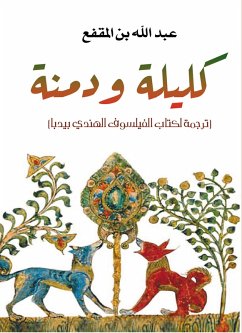The introduction to the book "Kalila and Dimna" states that the Indian philosopher "Bidba" wrote it for the King of India, "Dabishlim". The author used animals and birds as the main characters in it, and they basically symbolize human characters. The stories include several topics, the most prominent of which is the relationship between the ruler and the ruled, in addition to A number of sayings and sermons. When Khosrow Persian "Anushirvan" learned about the book and the sermons it contained, he ordered the doctor "Barzaviyeh" to go to India and copy what was contained in that book and transfer it to the Persian Pahlavi. The book includes a collection of stories, translated by Abdullah bin Al-Muqaffa from the Fahlawi language into the Arabic language in the Abbasid era, specifically in the second century AH, corresponding to the eighth century AD, and he formulated it in his literary style, adapting it from the original book. Many researchers agree that the book has Indian origins: the five chapters were written in Sanskrit in the fourth century AD, and then translated into the Pahlavi language in the early sixth century AD by order of Khosrau I. The Arabic version of the book played a major and important role in its spread and transfer to the languages ¿¿of the world, and ancient Arab critics classify the book Kalila and Dimna in the first class of Arab books and make it one of the four excellent books alongside Al-Kamil by Al-Mubarrad, Al-Bayan and Al-Tabyin by Al-Jahiz and Al-Umdah by Ibn Rasheq. .
Dieser Download kann aus rechtlichen Gründen nur mit Rechnungsadresse in A, B, BG, CY, CZ, D, DK, EW, E, FIN, F, GR, H, IRL, I, LT, L, LR, M, NL, PL, P, R, S, SLO, SK ausgeliefert werden.









